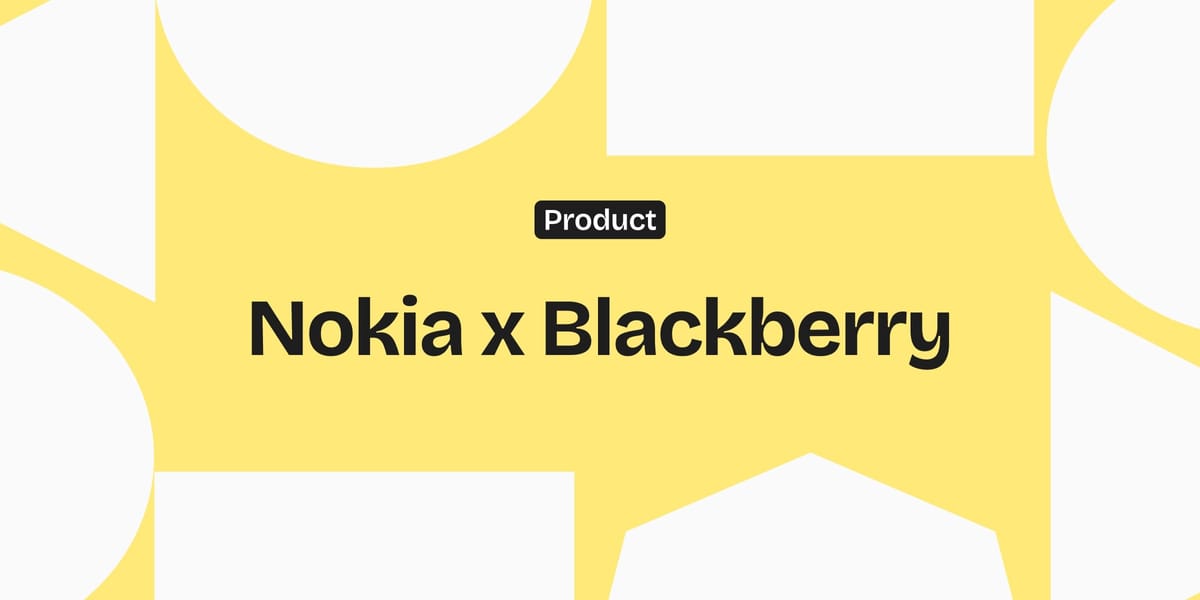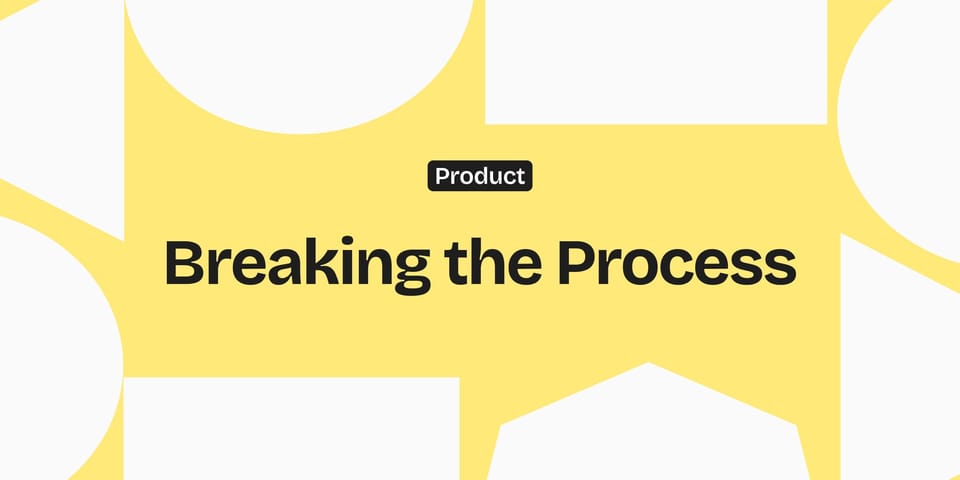What Startups Can Learn From the Fall of Nokia and BlackBerry
BlackBerry once owned over 50% of the US smartphone market. Nokia ruled half the world's pockets. And yet, both fell hard and fast - not because of bad luck, but because of bad assumptions. They ignored early signals, clung to legacy systems, and bet on the wrong future.

"Success is a lousy teacher. It seduces smart people into thinking they can't lose." - Bill Gates
Part1: The Rise and Fall
The BlackBerry Era
If you grew up in the 2000s, the BlackBerry was a symbol of power. BBM pins, full QWERTY keyboards, enterprise-grade email encryption - it was the device for executives and cool teenagers alike. In 2010, BlackBerry (then Research in Motion) held over 50% of the US smartphone market and around 20% globally.
This dominance was not accidental. They had built rock-solid relationships with telecom carriers, positioned themselves as secure enterprise-first hardware, and owned a loyal user base addicted to the red blinking light that meant "you have a new message."
Nokia: The King of Phones
Meanwhile, Nokia was the king globally. In many parts of the world - India, Africa, Europe - a Nokia phone wasn't a luxury, it was the default choice. Their reach was massive. At its peak in 2008, Nokia held over 40% of the global mobile phone market.
They had unbeatable supply chains, world-class hardware R&D, and a brand reputation for reliability. Their slogan, "Connecting People," wasn't just a punchline - they did that for billions.
What Went Wrong?
1. Touchscreen Was Not Taken Seriously
Both Nokia and BlackBerry underestimated the iPhone. When Jobs launched it in 2007, BlackBerry co-CEOs reportedly laughed at the idea of a phone without a keyboard. Nokia engineers dismissed multitouch as a gimmick.
Their internal cultures prioritized engineering excellence over product intuition. They believed keyboards, styluses, and small screens were necessary trade-offs.
Apple, in contrast, obsessed over making a phone feel like magic.
2. Old OS, New World
Nokia's Symbian was never meant for touchscreens. It had legacy code, outdated UX patterns, and lacked developer-friendliness. BlackBerry OS was similarly rigid.
Instead of reinventing the OS, both companies tried to patch legacy software to meet new user expectations. It led to bloat, inconsistency, and developer apathy. Meanwhile, Android and iOS gave developers clean APIs, touch-first UX, and a thriving app ecosystem.
Case in point: Nokia's N97 was supposed to be its iPhone killer. It bombed, plagued with lags, crashes, and a frustrating resistive touchscreen.
3. Enterprise Tunnel Vision
BlackBerry focused heavily on enterprise users, secure messaging, and integration with Microsoft Exchange. But they missed the consumer boom.
Social media, gaming, and video were becoming core use cases. Apple leaned into that. Google leaned into it. BlackBerry continued shipping devices with trackpads and physical keyboards while teenagers moved to Instagram and casual gaming.
As Kunal Shah often says: when you optimize for logic in a world of emotion, you lose.
4. Platform Thinking Was Late
Both BlackBerry and Nokia resisted building open app ecosystems.
Apple launched the App Store in 2008. Android followed suit with Google Play. Nokia had Ovi Store - clunky, limited, and poorly marketed. BlackBerry had App World, but it lacked the developer love and consumer excitement.
They failed to grasp that the platform was the product.
5. Late, Weak Partnerships
By the time Nokia realized Android was winning, it chose to partner with Microsoft. The Windows Phone OS wasn't bad, but it had no traction. Developers were reluctant. Consumers were confused.
BlackBerry briefly launched BB10, then tried Android, but the execution was late and half-hearted.
Contrast that with Samsung, which bet big and early on Android. That strategic partnership let Samsung ride the Android wave while customizing it to their strengths (hardware, marketing, scale).
6. Cultural Arrogance
Nokia and BlackBerry had internal cultures of denial. There were whistleblowers, but they weren't empowered. Leaders believed their engineering or market share would carry them through. Product thinking was missing.
A former Nokia executive once said, "We didn't do anything wrong, but somehow, we lost." That quote is famous because it captures the delusion.
Summary of Failures:
- Underestimated touchscreen UX
- Tried to retrofit old OS instead of building new
- Focused on enterprise while the world went consumer
- Resisted platform thinking
- Missed strategic partnerships
- Arrogant internal cultures
If you want to dive deeper, this Wired retrospective on Nokia is essential reading, as is The Verge's perspective on the fall of BlackBerry.
Part 2: Lessons for Startup Founders
So what does all this mean for us - product builders, startup founders, and tech designers?
1. Don't Ignore Weak Signals
The future whispers before it screams.
Nokia and BlackBerry saw the iPhone. They just didn't take it seriously. They thought they had time.
As founders, when we see early traction in a new UX pattern, a breakout product, or a strange new user behavior - investigate. Don't mock. Learn.
Examples today:
- LLM-native interfaces
- Decentralized consumer apps
- Hardware revival (like Humane or Rabbit)
2. Reinvent When the Terrain Changes
Nokia tried to stuff touchscreen UI into Symbian. BlackBerry kept its core OS and added half-baked gestures.
But Apple built iOS from scratch. Android was designed with touch-first as a default.
If your core tech stack or mental model isn't fit for the new terrain, start over.
This applies to:
- Legacy monoliths in AI-native apps
- Old-school marketing funnels in GenZ products
- Desktop paradigms in mobile-first worlds
Don't polish the past. Build the future.
3. MVP > Perfect Vision
The first iPhone didn't have copy-paste. No app store. But it nailed the core loop - touch, media, internet.
Nokia and BlackBerry waited for perfection and missed the train.
MVP thinking isn't about being minimal. It's about being magical in one dimension.
If your product does one thing brilliantly, users will wait for the rest.
4. Platform Thinking is Non-Negotiable
Today, if your app isn't integrated into a larger ecosystem (or building one), you're playing a losing game.
Look at how OpenAI is fostering plugins. How Notion evolved into a platform. How Shopify lets others build apps.
Ask: Are you a product, or a protocol others can build on?
Nokia and BlackBerry failed because they controlled too tightly. Apple succeeded because it created a playground.
5. Partner Early, and Partner Smart
Samsung didn't build an OS. It partnered fast and deep with Google.
If you're a startup, you may not have platform power. But you can borrow it. Whether it's distribution, capital, or credibility - find someone bigger to align with.
Examples:
- Launching with Apple Vision Pro integrations
- Plugging into Stripe's ecosystem
- Being featured by OpenAI or Notion
As Kunal Shah says: Your moat in early days is not code; it's leverage.
6. Narrative is Product
The first iPhone was a product launch. But more than that, it was a story about the future.
BlackBerry spoke in features. Apple spoke in dreams.
If you're not telling a story, you're just listing specs.
Think of how Elon Musk sells a vision - not just a car or a satellite. Think of how Steve Jobs turned keynote stages into poetry.
Even Bill Gates, once the nerd's nerd, evolved to speak in planetary scale missions.
Build your story with:
- Emotional stakes
- A clear enemy (status quo)
- A promised land
7. Internal Culture is Destiny
The internal stories Nokia and BlackBerry told themselves were "we're winning, we're smart, we've built it before."
They weren't wrong. They were just complacent.
Great startup cultures don't celebrate past wins. They question them. They're paranoid in a healthy way. They listen to customers, but they also observe users like anthropologists.
If your internal meetings feel like defense, not discovery, you're already Nokia.
Final Thoughts
The fall of Nokia and BlackBerry wasn't inevitable. But it was instructive. The world doesn't wait for good intentions. It rewards speed, courage, story, and obsession with users.
Startups have one edge: we can move before the giants do. Don't waste that advantage trying to play like a big company.
Be the iPhone in a room full of Nokias.




